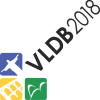
|
Junghanns, M. ; Kießling, M. ; Teichmann, N. ; Gomez, K. ; Petermann, A. ; Rahm, E. Declarative and distributed graph analytics with GRADOOPPVLDB |
|
| Paper |
Futher information: http://www.vldb.org/pvldb/vol11/p2006-junghanns.pdf
Abstract

|
Junghanns, M. ; Kießling, M. ; Teichmann, N. ; Gomez, K. ; Petermann, A. ; Rahm, E. Declarative and distributed graph analytics with GRADOOPPVLDB |
|
| Paper |
Futher information: http://www.vldb.org/pvldb/vol11/p2006-junghanns.pdf